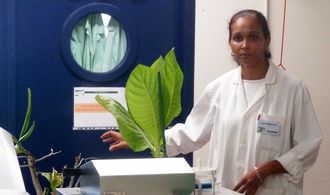The Plant Clinic gets a promotion
Written by Modified on the
Last December, the FDGDON Reunion Plant Clinic[1] was certified an ISO / IEC 17025 standard testing laboratory following an audit by the French Accreditation Committee - Cofrac. This is part of a strategy of openness and international recognition of the Plant Clinic’s work to meet the needs of administrations and businesses.
This accreditation is a guarantee of quality and is the result of a long and rigorous process that began in 2010. A laboratory is accredited if it has the "competence to meet the requirements of a reference standard recognized by an accrediting body" - in this instance, the Cofrac. The Head of the Plant Clinic Janice Minatchy told us: "To obtain the accreditation, we have to prove that we can meet the standard, prove that the samples remain intact from the beginning to the end of the analysis procedure and prove that we are constantly improving: we do not rest on our laurels, but strive for excellence." For now, this accreditation covers the quarantine viruses detected by ELISA serology techniques (CMV on banana and PepMV on tomato) and molecular biology (BBrMV on banana). The clinic is accredited for a period of four years with a planned audit every year to ensure that the practices in the laboratory are well in line with the standard.
A pioneer in the Indian Ocean
Thus, the Plant Clinic joined the French network of accredited laboratories capable of meeting the demands of formal analysis from the National Plant Protection Organization and the DAAF[2]. After the Departmental Analysis Laboratory of Martinique, the clinic became the second accredited French overseas plant health laboratory and is the only one in the South West Indian Ocean[3]. The laboratory may now respond to international requests for analyzes within in its remit because, thanks to multilateral agreements of which Cofrac is a signatory, a certification obtained in France is recognized in Europe and worldwide.
For 20 years, the Plant Clinic has been working in plant protection. It is open to anyone with a phytopathological problem or needs. It can answer questions such as: "What is attacking my crops? Why is my plant dying?" using two approaches: diagnosis and phytosanitary Council. "The Plant Clinic will act as a plant medical laboratory. Just like at the doctor’s, once a disease is diagnosed, a prescription is written." Throughout the year, the laboratory analyses all sorts of pathogenic organisms on fruit, vegetables, ornamental and other plants and then suggests the most suitable and environment-friendly control strategy.
[1] Departmental Federation of Defense Groups against Pests.
[2] Directorates of Food, Agriculture and Forestry.
[3] A Mauritian Plant Pathology Laboratory of the FAREI is also accredited since 2009.

